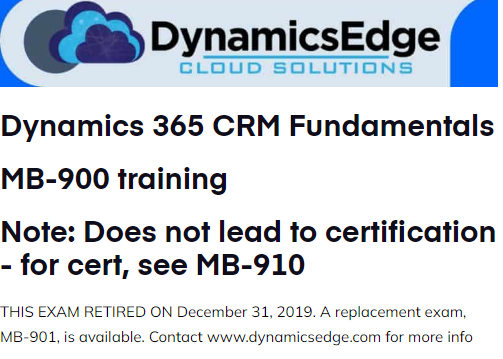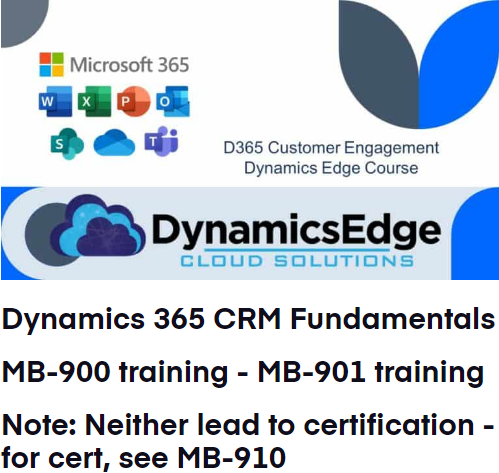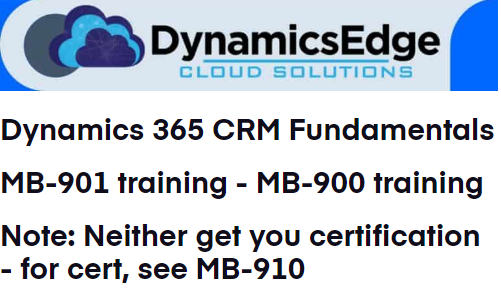Whether you find yourself in August 2023, or July 2023, June, May, April, or even sometime after July or August, Dynamics Edge has the right Dynamics CRM Fundamentals training options.
When preparing for the D365 fundamentals exam, it’s essential to understand cloud concepts such as the different cloud computing models (IaaS, PaaS, SaaS), cloud services providers like Azure, AWS, and Google Cloud, and cloud security models. Familiarize yourself with deployment methodologies like Agile and Waterfall, and principles of DevOps and continuous delivery.
In addition, it’s important to know how to configure and manage Dynamics 365 environments, including understanding environment types (Production, Sandbox, Trial), configuring instance settings, managing users and security roles, and customizing forms, fields, and views. A strong grasp of data and security management in Dynamics 365 is also crucial, covering the data model, data access, permissions, data import and export processes, backup and restore options, and data privacy and compliance regulations.
Integrating Dynamics 365 with external systems is another key topic. Understand integration concepts and patterns, such as APIs and Webhooks, and learn to configure integrations with external systems like SharePoint and Outlook, as well as Power Platform and other Microsoft services. Familiarize yourself with integration tools, technologies, and security protocols.
Furthermore, learn how to configure and use Dynamics 365 apps and modules like Sales, Customer Service, Field Service, and Marketing. Customize these apps and modules to meet specific business needs, manage records and entities, and understand workflows and business process flows. Additionally, master the creation and customization of dashboards and visualizations.
Reporting and analytics play a significant role in Dynamics 365. Learn to create and manage reports and dashboards, configure Power BI data visualizations, and understand data analysis, business intelligence, goal metrics, and AI capabilities. Working with Power Platform apps and services like Power Apps, Power BI, Power Automate, and Power Virtual Agents will help you expand your skillset within Dynamics 365.
Lastly, troubleshooting and monitoring Dynamics 365 performance is essential. Understand diagnostic tools and logs, performance settings and optimization techniques, and monitoring and alerting capabilities. Familiarize yourself with the Dynamics 365 licensing model, including licensing options, pricing, and compliance.
By mastering these fundamental concepts, which Dynamics Edge’s courses may help you with, you could be well-prepared for the MB-910 exam, MB-210 exam, and a strong foundation in Dynamics 365 overall.
After completing the MB-910 exam, you may want to explore more advanced Dynamics 365 certifications, such as MB-220 (Microsoft Dynamics 365 Marketing), MB-240 (Microsoft Dynamics 365 Field Service), or MB-260 (Microsoft Dynamics 365 Customer Insights). These certifications will help you specialize in specific areas of Dynamics 365, making you a valuable asset to potential employers and allowing you to further your career in the field.
MB-220 Training
For the MB-220 exam, it is focused on Microsoft Dynamics 365 Marketing and is designed for individuals seeking a role as a Microsoft Dynamics 365 Marketing Functional Consultant. Upon successful completion of the exam, candidates will earn the Microsoft Certified: Dynamics 365 Marketing Functional Consultant Associate certification.
The MB-220 exam covers topics such as configuring marketing applications, managing segments and lists, creating and managing marketing forms and pages, managing leads, and configuring and analyzing customer journeys. The exam is specifically designed for Microsoft Dynamics 365 Marketing, which is a powerful marketing automation tool within the Dynamics 365 suite.
Fundamental concepts important for the MB-220 exam include understanding the Dynamics 365 Marketing application, managing data and security, integrating Dynamics 365 Marketing with external systems, configuring and using Dynamics 365 Marketing apps and modules, and understanding Dynamics 365 Marketing reporting and analytics.
Additional fundamental topics of Microsoft Dynamics 365 Marketing that might not be covered in the exam but are still important include understanding marketing automation best practices, email marketing strategies, event management, and the integration of Dynamics 365 Marketing with other Dynamics 365 applications.
To further elaborate on the MB-220 exam and its relevance, this certification helps candidates demonstrate their expertise in configuring and managing Dynamics 365 Marketing, which is essential for businesses looking to automate and streamline their marketing efforts. The exam tests the ability to manage segments and lists, create marketing forms and pages, manage leads, and analyze customer journeys. As a Microsoft Dynamics 365 Marketing Functional Consultant, one will be responsible for implementing marketing strategies using the Dynamics 365 Marketing application, ensuring that the organization’s marketing efforts are optimized and aligned with their overall business objectives.
Moreover, understanding marketing automation best practices and email marketing strategies is crucial for effectively leveraging Dynamics 365 Marketing. These concepts may not be explicitly covered in the exam but will be invaluable in real-world scenarios. Additionally, knowledge of event management and the integration of Dynamics 365 Marketing with other Dynamics 365 applications can further enhance a consultant’s capabilities and make them a valuable asset to potential employers.
In conclusion, the MB-220 exam is an excellent opportunity for those looking to specialize in Dynamics 365 Marketing and become Microsoft Certified: Dynamics 365 Marketing Functional Consultant Associates. By mastering the fundamental concepts covered in the exam, as well as additional topics that may not be explicitly tested, candidates will be well-prepared to tackle marketing challenges and drive success for their organization using Dynamics 365 Marketing.
MB-240 Training
For the MB-240 exam, it is focused on Microsoft Dynamics 365 Field Service and is designed for individuals seeking a role as a Microsoft Dynamics 365 Field Service Functional Consultant. Upon successful completion of the exam, candidates will earn the Microsoft Certified: Dynamics 365 Field Service Functional Consultant Associate certification.
The MB-240 exam covers topics such as configuring field service applications, managing work orders, managing scheduling and dispatching, managing inventory and purchasing, and configuring and managing Connected Field Service. The exam is specifically designed for Microsoft Dynamics 365 Field Service, which is a comprehensive field service management solution within the Dynamics 365 suite.
Fundamental concepts important for the MB-240 exam include understanding the Dynamics 365 Field Service application, managing data and security, integrating Dynamics 365 Field Service with external systems, configuring and using Dynamics 365 Field Service apps and modules, and understanding Dynamics 365 Field Service reporting and analytics.
Additional fundamental topics of Microsoft Dynamics 365 Field Service that might not be covered in the exam but are still important include understanding field service best practices, resource management, Internet of Things (IoT) integration, and the connection of Dynamics 365 Field Service with other Dynamics 365 applications.
To further elaborate on the MB-240 exam and its relevance, this certification helps candidates demonstrate their expertise in configuring and managing Dynamics 365 Field Service, which is essential for businesses looking to optimize their field service operations. The exam tests the ability to manage work orders, scheduling and dispatching, inventory and purchasing, and Connected Field Service. As a Microsoft Dynamics 365 Field Service Functional Consultant, one will be responsible for implementing field service strategies using the Dynamics 365 Field Service application, ensuring that the organization’s field service operations are efficient and in line with their overall business objectives.
Moreover, understanding field service best practices and resource management is crucial for effectively leveraging Dynamics 365 Field Service. These concepts may not be explicitly covered in the exam but will be invaluable in real-world scenarios. Additionally, knowledge of IoT integration and the connection of Dynamics 365 Field Service with other Dynamics 365 applications can further enhance a consultant’s capabilities and make them a valuable asset to potential employers.
In conclusion, the MB-240 exam is an excellent opportunity for those looking to specialize in Dynamics 365 Field Service and become Microsoft Certified: Dynamics 365 Field Service Functional Consultant Associates. By mastering the fundamental concepts covered in the exam, as well as additional topics that may not be explicitly tested, candidates will be well-prepared to tackle field service challenges and drive success for their organization using Dynamics 365 Field Service.
MB-260 Training
For the MB-260 exam, it is focused on Microsoft Dynamics 365 Customer Insights and is designed for individuals seeking a role as a Microsoft Dynamics 365 Customer Insights Functional Consultant. Upon successful completion of the exam, candidates will earn the Microsoft Certified: Dynamics 365 Customer Insights Functional Consultant Associate certification.
The MB-260 exam covers topics such as setting up and configuring Customer Insights, unifying and enriching customer data, segmenting and analyzing customer data, and creating and managing customer profiles. The exam is specifically designed for Microsoft Dynamics 365 Customer Insights, which is a powerful customer data platform within the Dynamics 365 suite.
Fundamental concepts important for the MB-260 exam include understanding the Dynamics 365 Customer Insights application, managing data and security, integrating Dynamics 365 Customer Insights with external systems, configuring and using Dynamics 365 Customer Insights apps and modules, and understanding Dynamics 365 Customer Insights reporting and analytics.
Additional fundamental topics of Microsoft Dynamics 365 Customer Insights that might not be covered in the exam but are still important include understanding customer data platform best practices, data privacy and compliance, data cleansing and transformation, and the integration of Dynamics 365 Customer Insights with other Dynamics 365 applications.
To further elaborate on the MB-260 exam and its relevance, this certification helps candidates demonstrate their expertise in configuring and managing Dynamics 365 Customer Insights, which is essential for businesses looking to better understand and engage with their customers. The exam tests the ability to set up and configure Customer Insights, unify and enrich customer data, segment and analyze customer data, and create and manage customer profiles. As a Microsoft Dynamics 365 Customer Insights Functional Consultant, one will be responsible for implementing customer data strategies using the Dynamics 365 Customer Insights application, ensuring that the organization’s customer engagement efforts are data-driven and in line with their overall business objectives.
Moreover, understanding customer data platform best practices and data privacy and compliance is crucial for effectively leveraging Dynamics 365 Customer Insights. These concepts may not be explicitly covered in the exam but will be invaluable in real-world scenarios. Additionally, knowledge of data cleansing and transformation, and the integration of Dynamics 365 Customer Insights with other Dynamics 365 applications can further enhance a consultant’s capabilities and make them a valuable asset to potential employers.
In conclusion, the MB-260 exam is an excellent opportunity for those looking to specialize in Dynamics 365 Customer Insights and become Microsoft Certified: Dynamics 365 Customer Insights Functional Consultant Associates. By mastering the fundamental concepts covered in the exam, as well as additional topics that may not be explicitly tested, candidates will be well-prepared to tackle customer data challenges and drive success for their organization using Dynamics 365 Customer Insights.
Have a Question ?
Fill out this short form, one of our Experts will contact you soon.
Call Us Today For Your Free Consultation
Call Now


